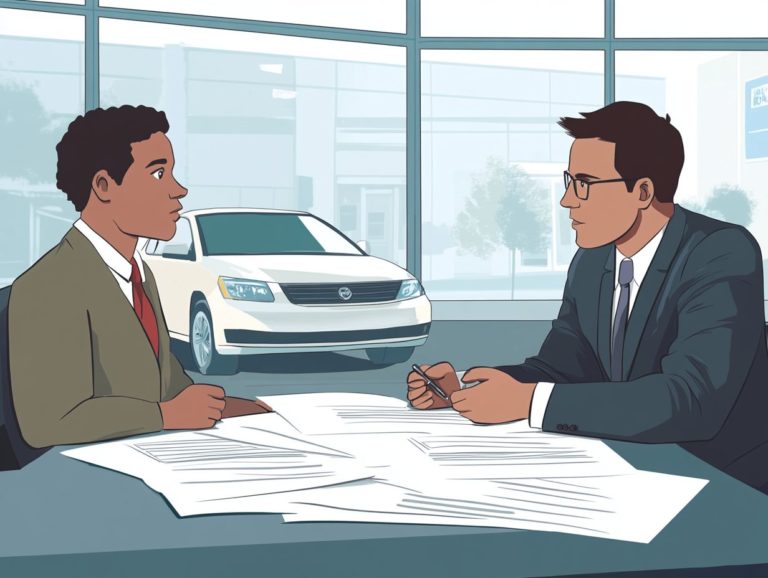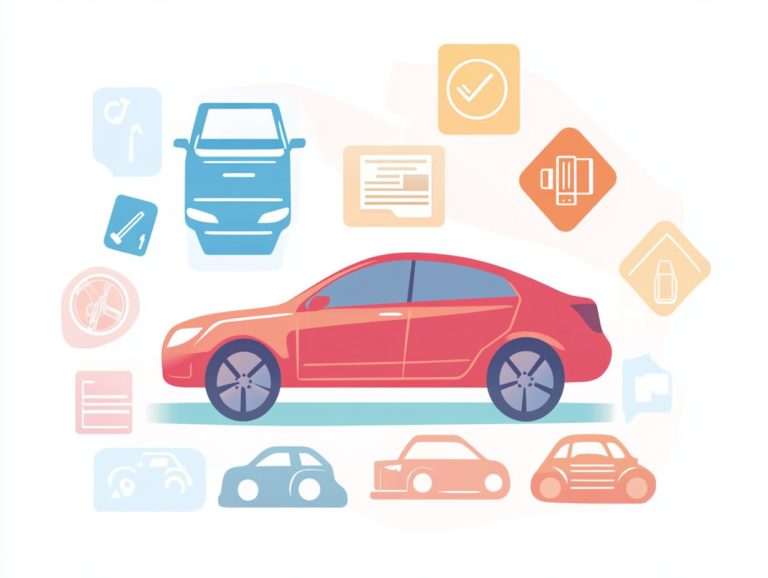How to Approach a Dealer After a Price Drop
Navigating the automotive industry can indeed feel overwhelming, especially with the ever-changing landscape of prices.
Understanding the reasons behind price fluctuations is essential for you as a buyer. This comprehensive guide walks you through every facet of the car-buying process, from market research and effective budgeting to employing negotiation tactics that truly deliver results.
It also gives insights on handling rejection calmly, ensuring that finalizing your deal goes off without a hitch. Whether you’re a novice in the car-buying arena or a seasoned pro, this guide equips you with the tools to secure the best deal possible.
Contents
- Key Takeaways:
- Understanding Price Drops in the Automotive Industry
- Preparing to Approach a Dealer
- Negotiating with the Dealer
- Dealing with Rejection
- Finalizing the Deal
- Frequently Asked Questions
- What should I do if I notice a price drop on a vehicle I am interested in?
- How can I approach a dealer after a price drop?
- Is it possible to talk about the price after a price drop?
- Should I wait for another price drop before approaching a dealer?
- Can I use a price drop as a strong point when talking about the price with a dealer?
- What should I do if the dealer is not willing to talk about the price after a price drop?
Key Takeaways:

- Do your research and know your budget before approaching a dealer after a price drop. This will help you negotiate effectively and avoid being taken advantage of.
- Prepare yourself to confidently handle rejection and counteroffers from the dealer. Stay calm and confident, and be willing to walk away if the deal is not in your favor.
- Finalize the deal with transparency. Double-check all the details and ensure that all agreements are put in writing to avoid misunderstandings in the future.
Understanding Price Drops in the Automotive Industry
Understanding price drops in the automotive industry requires examining various factors influencing pricing, including supply and demand fluctuations, seasonal trends, and external economic conditions.
To grasp how these elements shape the automotive market, turn to trusted resources like Kelley Blue Book and Edmunds. These platforms offer invaluable insights into fair market value and MSRP.
With this knowledge, you can navigate negotiations confidently and capitalize on lower market adjustment prices while shopping for your next vehicle.
Factors that Influence Price Changes
Several factors influence price changes in the automotive industry, such as annual percentage rates (APR), trade-in values, and enticing car rebates that dealerships use to attract buyers. Understanding these elements is key for anyone aiming to negotiate the best possible deal on a vehicle.
By keeping an eye on current interest rates, you can better evaluate your financing options, which directly affects your overall payment plan. Knowing the market value of your trade-in ensures you get a fair price, effectively lowering the final cost of your new vehicle.
Promotions from no-haggle dealers can simplify the buying process significantly, removing the stress typically associated with price negotiations. Utilizing online resources for quotes gives you insight into available discounts and incentives that fit your budget and preferences.
Preparing to Approach a Dealer
Preparing to approach a dealer involves essential steps that can greatly enhance your experience, such as securing preapproved financing and establishing your budget. These elements play a pivotal role in boosting your negotiating power.
Before you set foot in a dealership, conduct thorough research on prices and grasp the concept of total costs. This knowledge empowers you to negotiate effectively, paving the way for more favorable deals.
Researching the Market and Knowing Your Budget

Researching the market and understanding your budget are essential steps in the car-buying journey. This groundwork allows you to navigate the complexities of dealer fees and market adjustment prices with confidence.
By familiarizing yourself with your financing options and crunching the numbers, you gain valuable leverage in negotiations. Take the time to analyze local market conditions to identify fair pricing trends. Compile data from various dealerships to become aware of common fees that could be added during the sale.
Diving into online resources and forums can uncover insights from seasoned buyers who’ve successfully negotiated their deals. Equally important is understanding your financing options.
Understanding loan terms and interest rates not only informs your budget but also enables you to challenge any unfavorable offers from dealers. With a clear knowledge of these factors, you can engage confidently in negotiations, setting the stage for a more favorable purchase.
Ready to negotiate? Start your research today!
Negotiating with the Dealer
Negotiating with the dealer requires a carefully crafted strategy, using smart negotiation techniques to increase your chances of getting an advantageous deal.
By grasping fair market value and leveraging insightful car buying tips, you can confidently walk away if the terms fail to align with your expectations.
Effective Strategies for Getting the Best Deal
Employing effective strategies to secure the best deal is essential in your car-buying journey, whether you’re negotiating with traditional dealerships or opting for no-haggle dealers.
Understanding your financing options boosts your bargaining power. This means being aware of the yearly cost of borrowing money, or annual percentage rates.
Start by researching various financing options and comparing offers from banks and credit unions to maximize your advantage.
This knowledge enables you to counter common dealership tactics like inflated interest rates or unnecessary add-ons with confidence.
Prepare to negotiate your trade-ins separately, ensuring clarity in each aspect of the transaction.
When faced with pushback, maintain your composure and stand firm in your expectations. Reiterate your budget and the research you’ve conducted.
Consider leveraging pre-approved financing as a powerful bargaining chip; dealerships often strive to meet or beat these offers.
Employing such strategies strengthens your position and sets the stage for a more satisfying car-buying experience.
Dealing with Rejection
Navigating rejection during negotiations can be challenging, but knowing how to respond to a counteroffer enables you to handle these moments with finesse.
By employing strong negotiating strategies and discerning the right time to walk away, you can safeguard your investment and ensure consumer protection remains a priority throughout your car-buying journey.
How to Handle a Dealer’s Counteroffer

Handling a dealer s counteroffer requires a strategic approach, focusing on your budget and fair market value expectations to stay in control of the negotiation process.
Understand your trade-in value and keep clarity on the total cost of the car, including taxes and fees, to respond effectively to any counteroffer.
Research comparable vehicle prices in your area to enhance your negotiation outcomes; this knowledge will strengthen your position.
When faced with a counteroffer that exceeds your budget, confidently reiterate your financial limits while expressing appreciation for the vehicle’s value.
This diplomatic tone helps maintain goodwill and keeps the conversation constructive.
Use a clear breakdown of all costs to spot hidden fees and address them upfront. Ultimately, adopting a calm and knowledgeable demeanor enables you to navigate the complexities of the deal while sticking to your budgetary constraints.
Finalizing the Deal
Finalizing the deal is a pivotal moment in your car-buying journey. Now is the time to secure the best deal and avoid any hidden pitfalls!
By making sure that every detail of the deal, including car insurance, is clearly defined, you can confidently solidify your purchase and drive away with peace of mind.
Closing the Sale and Ensuring Transparency
Closing the sale effectively demands careful attention to detail, ensuring that all dealer fees, financing options, and trade-in values are crystal clear before you sign any agreements.
At this stage, transparency is paramount to avoid unexpected costs that could emerge after the purchase.
Start by meticulously reviewing the sales contract, searching for hidden charges or terms that might impact the final price.
Engage in discussions about financing options, taking into account the interest rates and loan terms available to you.
A thorough understanding of dealer fees like documentation or processing costs will aid in constructing a comprehensive budget.
Evaluating the trade-in value can also give you an edge in negotiations. By following these steps, you position yourself to make an informed decision and secure the best possible deal.
Frequently Asked Questions
Here are some common questions to help you navigate your car-buying journey:
- What should I do if the dealer won’t budge on price? Consider walking away if the offer doesn’t meet your expectations. Sometimes, dealers will reach out with a better offer later.
- How do I know if I’m getting a fair trade-in value? Research your car’s trade-in value using online tools like Kelley Blue Book or Edmunds to get an accurate estimate.
- What other fees should I look out for? Be on the lookout for dealer fees, documentation fees, and any additional add-ons that can increase the overall cost.
Prepare well and enjoy the process of buying your car!
What should I do if I notice a price drop on a vehicle I am interested in?

If you notice a price drop on a vehicle, act quickly. Reach out to the dealer and share your interest; this can help you get a better price and save money.
How can I approach a dealer after a price drop?
The best way to approach a dealer is to research beforehand. Know the original price and compare it to the new price to negotiate confidently.
Is it possible to talk about the price after a price drop?
Yes, you can definitely talk about the price. Many dealers expect this and are open to discussions with interested buyers.
Should I wait for another price drop before approaching a dealer?
While it s tempting to wait, acting fast can secure your dream vehicle! Prices can change, and the car you want might be sold to someone else.
Can I use a price drop as a strong point when talking about the price with a dealer?
Yes, use a price drop to your advantage. It shows the dealer is flexible, but be respectful since they may have their reasons for the drop.
What should I do if the dealer is not willing to talk about the price after a price drop?
If the dealer is firm on their price, you can either accept it or keep looking for a better deal. Remember to stick to your budget and avoid overspending.






